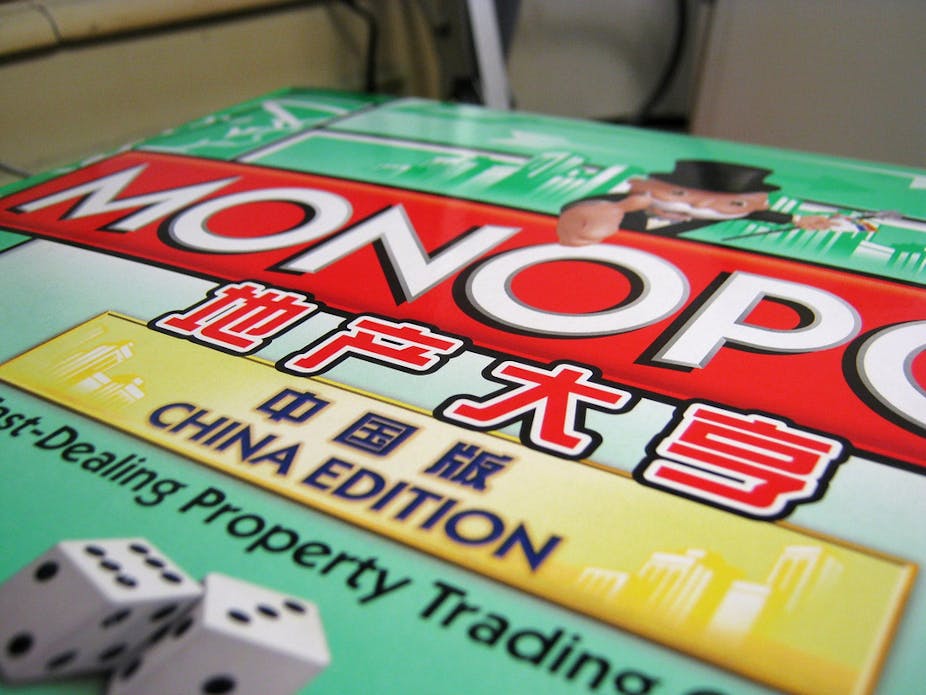If multinationals operating in China were not already aware China has a competition law and is not afraid to use it, events of the past few weeks should have prompted them to call their lawyers and ask about the Anti-Monopoly Law. Apart from legal matters, that conversation would have involved a discussion of Chinese politics.
Chinese regulatory authorities have recently announced a number of high-profile anti-monopoly cases involving foreign businesses.
Yesterday, 12 Japanese auto parts and bearing companies were fined RMB 1.2354 billion (approximately US$201 million) for price fixing. Chrysler and Audi also face penalties for price fixing, as part of a wider investigation of over a year or more into the auto industry.
Anti-monopoly government officials raided Microsoft and Mercedes-Benz’s offices. Many people expect that Qualcomm will be slapped with a large fine for abusing its market dominance, and even the recent firing of a Chinese government advisor has been linked to that investigation.
InterDigital was subject to an anti-monopoly investigation, but recently successfully negotiated a settlement by promising not to charge high patent licensing fees to Chinese customers. That was agreed only after settling its protracted patent licensing dispute with Huawei. The Chinese government also recently blocked the proposed P3 shipping alliance, leading to its abandonment.
What’s really behind it?
These investigations have fuelled widespread speculation China is using its anti-monopoly law to pressure foreign businesses into lowering their prices in China. Indeed, a number of foreign car companies have lowered prices for new cars and spare parts in response to the auto industry investigation.
Another accusation levelled against Chinese authorities is that they are deliberately targeting foreign companies and enforcing the anti-monopoly law to protect, promote or gain advantages for Chinese businesses.
These cases demonstrate the growing familiarity and confidence that Chinese anti-monopoly authorities have with enforcing the law. Other competition authorities have previously investigated a number of these companies and China is now finally catching up. It is also consistent with the increasing caseload these authorities have taken on in the past couple of years.
The political and economic context
It is not uncommon to use law as a regulatory tool in China. The government has made it clear from the beginning that it regards the anti-monopoly law as another means to help it control and stabilise prices. For example, the anti-monopoly investigation into multinational infant formula producers for price fixing last year was part of a range of measures, including traditional interventionist measures, that were used to lower prices and increase supply of imported infant formula.
Similarly, the power dynamics of anti-monopoly enforcement indicate that foreign companies may be more vulnerable than Chinese companies to enforcement activity.
China’s state-owned enterprises (SOEs) and foreign companies are the natural targets of the anti-monopoly law. A number of foreign firms have leading market positions and competitive advantages, especially those in high-tech industries. SOEs are typically the dominant or major players in important Chinese industries.
However, it’s difficult for the anti-monopoly authorities to investigate and sanction SOEs. SOEs are not only politically and economically powerful and influential players in their own right, they also have the backing of industry regulators.
In contrast, although foreign companies are not poor, weak players who lack political connections, it is nonetheless politically easier for anti-monopoly authorities to investigate cases involving foreign companies.
Keeping Xi happy
What is particularly interesting about these recent cases is how they fit in with the broader power dynamics and political priorities under Xi Jinping’s leadership.
Since coming to power, Xi has pushed a seemingly contradictory political and economic agenda. On the one hand, he has reinvigorated economic reforms and embarked on a strong campaign against corruption. A number of SOE reforms, which are focused on diversifying SOE ownership and improving corporate governance and management, are being implemented. On the other hand, Xi has tightened political and ideological control, emphasised nationalism, and reaffirmed the leading role of the state in the economy.
Government authorities are looking to implement Xi’s agenda using the anti-monopoly law to demonstrate their relevance and preserve their power in the Xi-Li administration. These cases fit in well with the current emphasis on nationalism. They also address the long-held public perception and complaints that foreign companies have been exploiting Chinese consumers. The focus on investigating high-tech industries and patent licensing is consistent too with China’s push for indigenous innovation and to move its economy up the value chain.
So, what can multinationals learn from the recent spike in anti-monopoly enforcement activity against foreign companies doing business in China? The answer is simple: to properly manage anti-monopoly risks in China, they need much more than a good understanding of the words of the law. They must be well-versed in Chinese politics.

